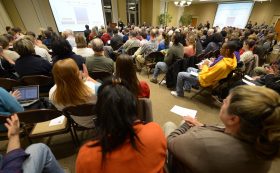Elon faculty along with community members share stories, cite statistics and offer suggestions to combat poverty in the county.

“In our country today, too many people can barely make ends meet,” said Toddie Peters, professor of religious studies and coordinator of the poverty and social justice program at Elon.
Peters, along with Nikki Ratliff, program services director for Burlington Housing Authority, John Hood, president and chairman of the John Locke Foundation, and Tom Henricks, professor of sociology, were the invited panelists in the second of three Community Connections programs planned this school year.
In addition, five “community panelists,” several of whom work directly with low-income people seeking services in the nonprofit sector, participated in the conversation that was held in McKinnon Hall and hosted by Elon University in partnership with the Burlington Times-News. The more than 200 people who showed up for the event were encouraged to ask questions as well as give their own opinions to “Poll Everywhere” via text or Twitter.
The forum, held on the eve of President Barack Obama’s State of the Union address, focused on this critical issue 50 years after President Lyndon B. Johnson declared a “war on poverty” in his address. Johnson’s declaration ultimately led to several initiatives, including the creation of Medicare, Medicaid, Head Start and food stamp programs.

“While the mythology of the American dream ostensibly gives hope to the poor and working class people that it is possible for those who are talented and hard working to climb out of poverty, we live in a world where it is nearly impossible for a third of the population to pay all their bills, even in families where one person is working full time,” Peters said.
The inability for many to change their lives enough to move out of poverty is a “moral crisis,” Peters said. She suggested that the path to changing that is through the creation of more jobs as well as access to affordable housing, quality public schools, public transportation and healthy foods.
Hood said that a lot of the dollars spent by the county, state and federal government to combat poverty isn’t accounted for in statistics.
“If you give families low-income public housing, if you give them food stamps or an earned income tax credit, it does not show up in the income that is used to determine the poverty statistics,” Hood said.
Most conservatives think the “war on poverty has been extremely expensive and the poverty rate has barely changed,” Hood said, although he doesn’t think that’s an accurate picture of the problem.
“The real poverty rate, if measured by consumption rather than by income, has declined substantially since the mid 1960s,” Hood said.
Last month Burlington Housing Authority received 80 applications for public housing. Although there are 368 public housing units, there are not 80 vacancies, Ratliff said.
“Let’s say we have only five vacancies. What happens to the other 75 families?” Ratliff asked. “They are forced to rent substandard housing. They might be forced to go be shelter guests.”
The people who seek public housing often don’t have a choice about where they live, Ratliff said
“They want to be able to live out their own dreams that are defined by them,” she said. “Fair access and removal of barriers to the basics are what those in poverty need the most. … Many of the people that I come into contact with in public housing want to leave public housing as quickly as they receive the keys to enter public housing.”
Many rely on the services offered in the community in order to feed, clothe and shelter their children. Kim Crawford, executive director of Allied Churches of Alamance County, told the story of a woman whose husband works, but they still run out of money by the end of the month.
“This past week she received some fresh milk and cereal because she didn’t have enough money to feed her little girls,” said Crawford, who added that agencies, such as Allied Churches, have to respond immediately to people in crisis, but it’s not the only answer.
“Effective help for homeless people, hungry people, people living in poverty walks on two legs: the leg of charity and the leg of public policy,” Crawford said. “People of good will must respond to immediate needs with immediate help, but the fight against poverty won’t move forward if we don’t use the other leg and advocate for better government policies.”
Henricks cited many reasons why the war on poverty hasn’t been won from spiraling health-care costs to changes in the retirement system to increasing housing costs,.
“Now I feel like we have a war on the poor,” he said. “I will be the first to say my generation has done a poor job with these issues. We have fallen into ideological posturing. I will say the younger generation needs to put that aside. We need to craft practical solutions because we are not doing enough.”
Another Community Connections forum is tentatively scheduled for April.


